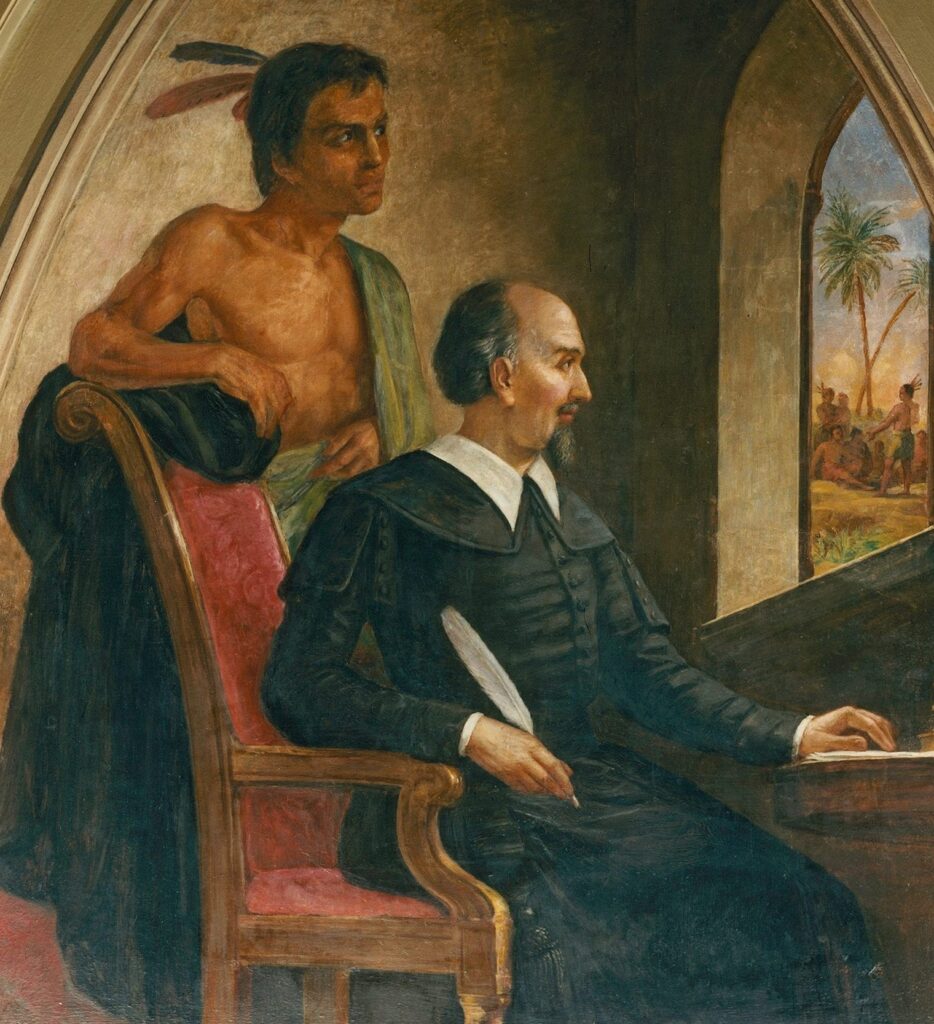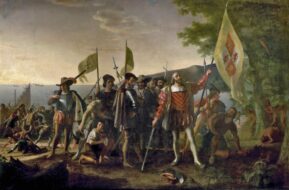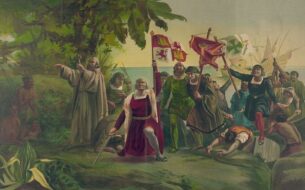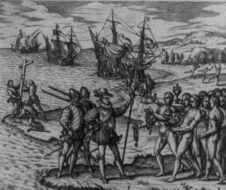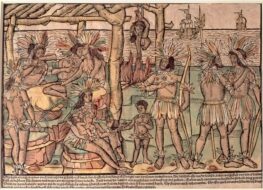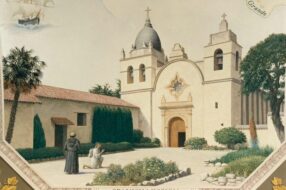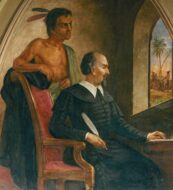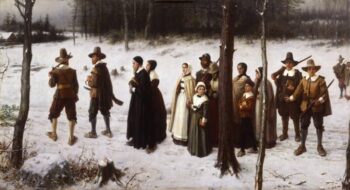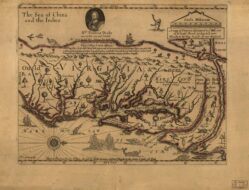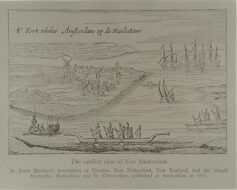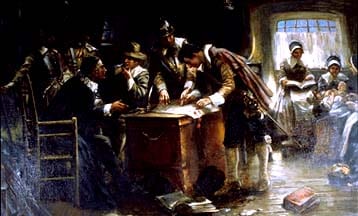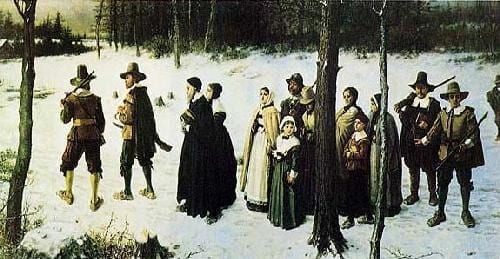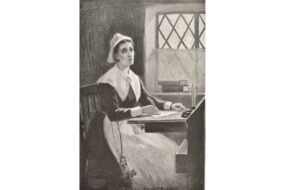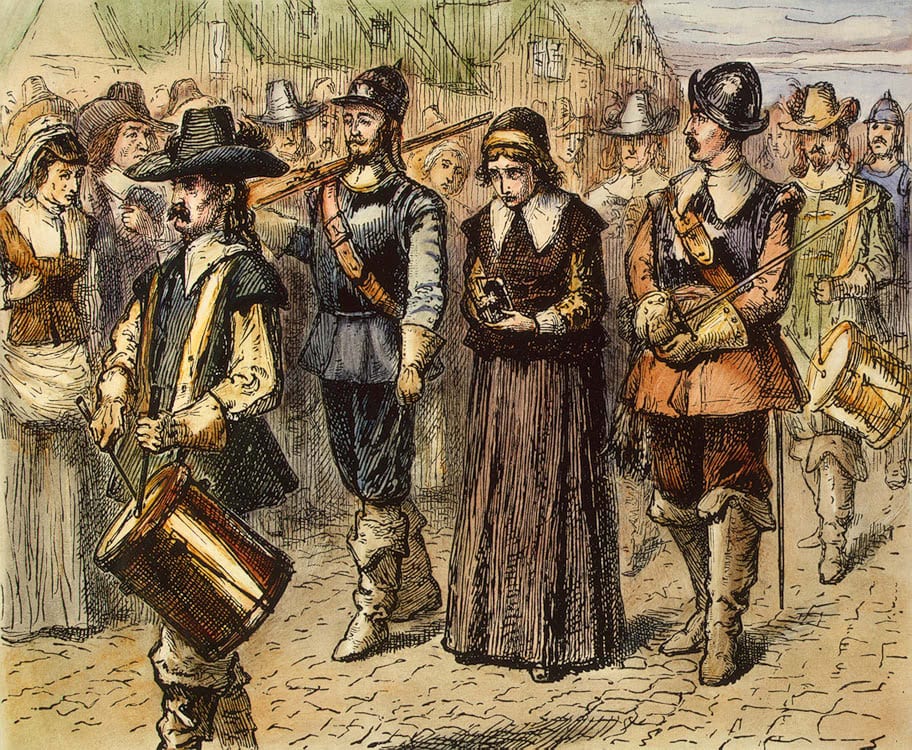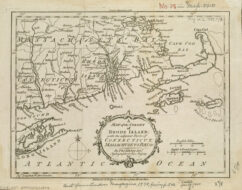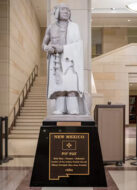Introduction
How to treat the indigenous people became an issue as soon as the Spanish arrived in the Western Hemisphere. In a letter written soon after his first voyage, Christopher Columbus explained how he dealt with the natives and revealed his and Spain’s religious motive for exploring what he conceived to be, in explicitly religious terms (see Christopher Columbus to Doña Juana de Torres, 1500) a New World. In addition to the converts to Catholicism that Columbus mentions, the Spanish sought gold. What means were allowable in pursuit of these ends? By what authority did the Spanish make claims on the native people and their land? The Requerimiento provided the official answer to these questions.
Whatever Spanish justifications, the Spanish conquistadores or conquerors proved brutal and rapacious as the conquest continued. The authorities in Madrid did not approve. For example, laws regulating conduct in the conquest were promulgated in 1513 and 1542 (the latter partially repealed in 1545 because of opposition). They relieved Christopher Columbus of command over land he had discovered in part because of his brutality toward both Spanish settlers and the indigenous people. Columbus complained of the injustice of his removal (see Christopher Columbus to Doña Juana de Torres, 1500), by emphasizing that the New World was not like Spain but was an uncivilized lawless territory. Francisco de Vitoria, on the contrary, (see De Indis) sought to mitigate the harshness of the conquest by arguing that law – civil, natural and divine – should prevail everywhere. He argued for limits on what could legitimately be done to the indigenous people. In doing so, he helped develop just war theory. Despite de Vitoria’s arguments, distance from Madrid, limited means of communication, and the need for colonial wealth reduced the ability and willingness of Spain’s monarchs to control what was done in their name thousands of miles away from their palaces. Bartolomé de las Casas (A Short Description of the Destruction of the Indies, 1542) describes the consequences of the Spanish conquest. Las Casas participated in the conquest he recounts; he was also in Cuba during the conquest of that island. He eventually became a Dominican friar and worked for the rest of his life to protect the indigenous people of the Americas
Source: We have used a modernized version of an early English translation of the work by an individual known only as M.M.S., retitled The Spanish Colonie (London: 1583); available online: https://goo.gl/H2YDtk.
. . . The Fifth Kingdom was Hiquey, over which Queen Hiquanama, an elderly Princess, whom the Spaniards Crucified, presided and governed. I saw an infinite number of these people burned, and dismembered, and racked with various torments, and of those who survived these matchless evils who were then enslaved. But because so much might be said concerning the killing and destruction of these people, as cannot without great difficulty be written (nor do I conceive that one part of 1,000 that is here contained can be fully displayed) I will only add one remark more about the previously mentioned wars, and declare upon my conscience, that notwithstanding all the above-named injustice, profligate enormities and other crimes which I omit, (though sufficiently known to me) the Indians did not, nor was it in their power to, give [the Spaniards] any cause for these crimes, any more than the pious religious living in a well-regulated Monastery could give a sacrilegious villain any reason to deprive them of their goods and life. No was there any cause for the Spaniards to enslave in perpetuity those who survived the initial massacre. I really believe and am satisfied by certain undeniable conjectures, that at the very time when all these outrages were committed in this Isle, the Indians were not so much guilty of one single mortal sin of commission against the Spaniards, that might deserve from anyone such revenge. And as for those sins, the punishment of which God reserves to himself, such as the immoderate desire of revenge, hatred, envy or inward rancor of spirit, to which [the Indians] might be led against such capital enemies as the Spaniards, I judge that very few of [the Indians] can justly be accused of them; for their impetuosity and vigor, I know, to be inferior to that of children of ten or twelve years of age. And I can assure you, that the Indians had every just cause to wage war against the Spaniards, and the Spaniards on the contrary never waged a just war against them, but only what was more injurious and groundless than any undertaken by the worst of Tyrants. This was true of all their actions in America.
The wars being over, and the inhabitants all swept away, the Spaniards divided among themselves the young men, women, and children, one taking thirty, another forty, to this man one hundred were given, to the other two hundred. The more one was in favor with the domineering tyrant (whom they styled Governor), the more slaves he got, under the pretense, and on the condition, that he should instruct the slave in the Catholic religion. Yet, those Spaniards to whom the Indians were given were themselves for the most part idiotic, cruel, avaricious, and infected with all sorts of vices. And this was the great care they had of [the Indians]: they sent the men to the mines to dig for gold, which is an intolerable labor; the women they turned to tilling and manuring the ground, which is drudgery even to men of the strongest and most robust constitutions. They gave them nothing else to eat but wild grasses and other such insubstantial nutriment, so that the milk of nursing women dried up, which meant that recently born infants all died. Since the females were separated from and did not live with the men, there were no new births among them. The men died in the mines, starved and oppressed with labor, and the women perished in the fields, broken from the same evils and calamities. Thus, the infinite number of inhabitants that formerly peopled this island were exterminated and dwindled away to nothing. They were compelled to carry burdens of eighty or one hundred pound weight a hundred or two hundred miles. They had to carry the Spaniards on their shoulders in a carriage or a kind of bed woven by the Indians. In truth they made use of them as beasts to carry baggage on their journeys, so much so that it frequently happened that the shoulders and backs of the Indians were deeply marked with sores, just as happens with animals that carry heavy burdens. It would take a long time, and many reams of paper to describe the slashes with whips, blows with staves, beatings and curses, and all the other torments they suffered during these backbreaking journeys, and even then it would only create horror and dismay in the reader.
But it is true that the desolation of these islands began only with the death of the most Serene Queen Isabella, about the year 1504. Before that time very few of the provinces situated in that island [Hispaniola] were oppressed or spoiled with unjust wars, or violated with general devastation as they were afterwards. Most if not all these things were concealed and masked from the Queen’s knowledge (whom I hope God hath crowned with Eternal Glory) for she was transported with fervent and wonderful zeal, in fact, almost Divine desire for the salvation and preservation of these people, as we have seen with our own eyes and cannot easily forget.
Take this also for a general rule, that no matter which coast in the Americas the Spaniards were landed on, they carried out the same cruelties, slaughters, tyrannies and detestable oppressions on the most innocent Indian nations. The more time they spent in the Americas the more they diverted themselves with new ways of tormenting the Indians, improving in barbarism and cruelty. As a consequence, God, incensed at them, allowed them to fall into complete wickedness.


